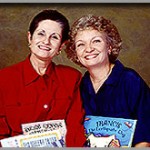In the spring of 1979, Judith Ross Enderle and Stephanie Jacob Gordon first met in a UCLA writing class. They became instant friends and have worked hard to become one of the few successful children’s author teams. When they met, Enderle had just published her first children’s book, Good Junk, and Gordon was beginning to explore a career in writing for children. “I was a children’s writer since I knew how to write,” says Gordon. “My heroines and heroes have always been children.”
Early in their careers, Enderle and Gordon published over 20 young adult novels separately and together. In 1985 when their first joint young adult novel was published, the editor said there was room for only one author’s name on the cover of the book. Who wanted to be left out? Instead of eliminating one of their names, Enderle devised a pseudonym: Jeffie (from Judy and Stephanie) Ross (Enderle’s maiden name) Gordon. They wrote under this combined pseudonym for several years until they started traveling to promote their picture books. Teachers and librarians began wondering why Jeffie Ross Gordon was two women, and not one man.
In 1988, the young adult series for which they were writing fizzled out. “We’d written so many of them, we had written our whole teenage life,” quips Gordon. According to Enderle, it was time to try something new. They chose picture books.
When they develop a picture book, Enderle and Gordon like to “what if.” Sometimes a title idea starts the “what if” process, like with Six Sleepy Sheep. Sometimes an unusual sight begins the process. For instance, Gordon (a self-proclaimed city girl) once saw a pile of pigs laying about in a farmyard and began wondering why they do that. After Enderle’s and Gordon’s characteristic wondering and “what if”ing, A Pile of Pigs was born. Enderle and Gordon claim they don’t choose the ideas they write about, rather the ideas choose them. According to Enderle, “we start with an initial idea, and if it keeps nagging at us we pursue it and it develops itself.”
Enderle and Gordon work hard to find just the right words for their stories. They read their books out loud to each other, hunting for words that convey a sense of fun and rhythm. They are particularly good at employing poetic devices. Their “Six Sheep” stories use alliteration making the stories almost musical: “Six sandy sheep spread out on the beach one sunny summer day.” Nell Nugget and the Cow Caper captures the fun of onomatopoeia: “That night Nell played her piano. PLINK, PLUNKETY, PLINK.” Illustrator Paul Yalowitz uses the onomatopoeia in his illustrations, visually building a second story for children to enjoy.
Nell Nugget is Gordon’s favorite character created by the writing team. “She’s feisty; I get a kick out of her. I want to be her if I ever grow up.” But Enderle prefers the twins featured in Two Badd Babies. “The rhythm of the story works so well. . .they represent Stephanie and I as we travel and have our adventures.”
In addition to creating books for children, Enderle and Gordon worked as freelance editors for Boyds Mills Press; edited Fox Totally Kids magazine; wrote and edited 26 screenplays for “Rimba’s Island”, a FOX preschool television series; and wrote an animated special called “Corduroy, The Circus.” They currently own a successful manuscript critique service called Writers Ink. Both Enderle and Gordon reside in Southern California and they each have three children. They even share two dogs which actually live at their office—Dalai and Sase (pronounced sassy—an acronym for self-addressed, stamped envelope). According to Gordon, even the dogs think they write children’s books.
Enderle and Gordon have met thousands of children, teachers, and future writers. To each encounter they bring an enthusiasm for creating children’s books that’s infectious. They want to share the magic that lived in the books they read as children. According to Enderle, “if we can make our audience laugh while they read, we feel they’ll want to come back to reading over and over. The children’s book writer’s challenge is to hook today’s children to become tomorrow’s adult readers.”


